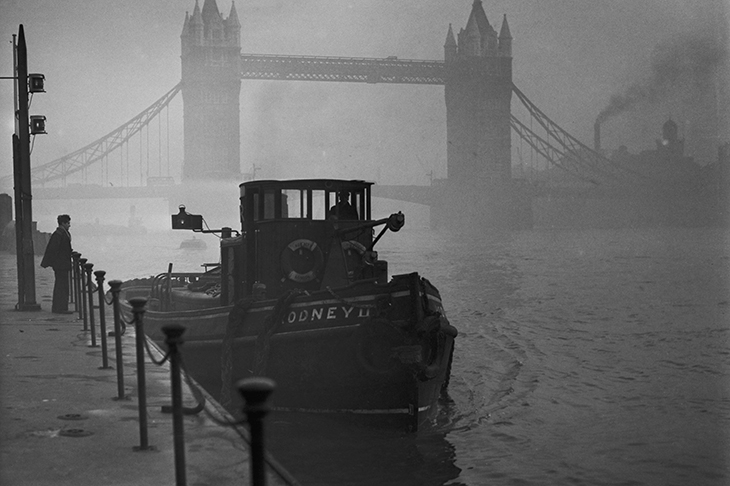We are, of course, in the midst of an air pollution crisis which, like every other threat to our health these days, is ‘worse than smoking’. According to the Royal College of Physicians, everyone in Britain is effectively smoking at least one cigarette a day, rising to many more in the most polluted cities. What’s more, as Bloomberg once put it, London has a ‘Dirty Secret: Pollution Worse than Beijing’s’. And London’s air pollution has ‘been at illegal levels since 2010’, according to the New York Times.
Serious though the problem may be — I’ll take Public Health England’s word for it that air pollution contributes to between 28,000 and 36,000 deaths per year — the hyperbole misses something important: that the air in Britain has become steadily cleaner over the past 70 years. I can still smell London as it was in the early 1970s. I remember my childhood visits and how my mother would insist on washing my hair as soon as we returned, the water in the basin turning black afterwards. And I was born a decade after the 1956 Clean Air Act, when ‘pea-souper’ smogs were already a distant memory.
But never mind anecdote — the Department for the Environment and Rural Affairs has been keeping comparable statistics since 1970. Sulphur dioxide pollution in Britain has since declined by 97 per cent. That, perhaps, is not surprising, given that the main source of it was coal-burning — something which largely disappeared after the Clean Air Acts. But progress on other forms of pollution has been pretty drastic, too. Nitrogen oxide pollution is down 72 per cent, non-methane volatile organic compounds down 66 per cent, PM10s (large diameter particles of soot and other matter) down 73 per cent and PM2.5s (small diameter particles) down 79 per cent.
Not that you would guess any of this from the daily smog of coverage of Britain’s pollution crisis, which seems to turn on the conceit that no one save for a handful of activists has ever thought seriously about tackling it. The reality is that year on year, governments have legislated to improve air quality.
Why is it important to understand this? Because without doing so you don’t learn how progress on environment issues is made. You lay yourself open to being influenced by the propaganda of the left which tries to make out air pollution, like climate change, is a product of the evils of global capitalism — neatly sidestepping the fact that it was a Conservative government which passed the first Clean Air Act, removed lead from petrol and made the big switch from coal power to gas power in the 1980s and 1990s, when many on the left were still championing coal mining.
The more we invest in fighting air pollution, the more we discover and the worse the problem seems to become. That is why it becomes possible to make the claim, as the Guardian once did, that ‘London has an acute problem with NO2, possibly the worst in the world’. What it fails to acknowledge is that London has some of the highest-measured rates of nitrogen oxide pollution because the city’s authorities are making some of the most stringent efforts to measure it. As for breaking laws on air pollution, we only break them because we make them. If London’s air pollution has been at illegal levels since 2010, it is because that was the year when a new target threshold for PM10 pollution came into effect — it doesn’t mean that the air was cleaner prior to that year.
It is important to understand the history of air pollution to understand, too, where things have gone wrong in the past. We have higher levels of nitrogen oxide than we ought to, because for many years all environmental policy was reduced to a single issue: carbon emissions and climate change. Through that lens it made sense for the Blair government, and the EU’s then transport commissioner, Lord Kinnock, to incentivise motorists to switch to diesel cars. Mile for mile they emit a little less CO2 — but far more NO2. It is the same with wood-burning. There was a small rise in particulate pollution between 2016 and 2017, reversing decades of progress. Why? The clue lies in what DEFRA describes as ‘wood in domestic combustion activities’, which accounted for a third of all PM2.5 pollution in 2017 — ie. middle-class homeowners installing wood-burners and wood-boilers. Bizarrely, this is a form of air pollution which the Cameron government set out to encourage with generous subsidies inspired by carbon reduction targets. In doing so, it seemed to forget the lessons of the London pea-soupers of the 1950s.
The air could and should be a lot cleaner than it is, but it is a lot cleaner than it used to be. To achieve the former, it helps first to acknowledge the latter.







Comments